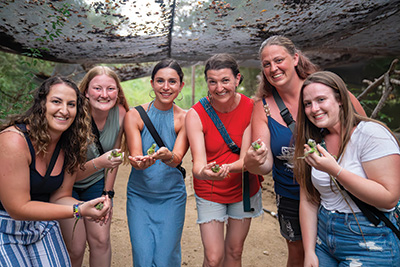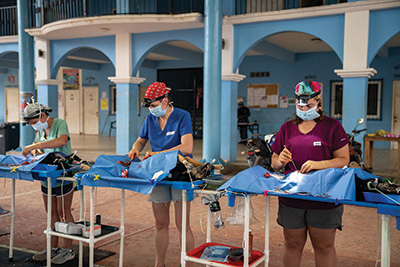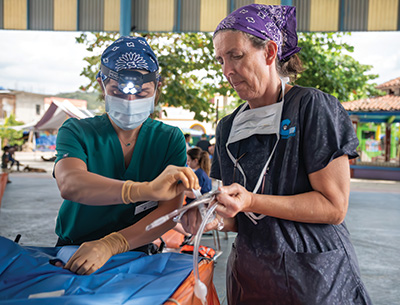

By Kristen Lare
Bright sunlight, warm waves, and sandy beaches are welcome respites for travelers during an icy Michigan winter. But the beach isn’t the primary draw for a team of MSU students and faculty to visit Mazunte, Mexico, each January. They are attracted by an important outreach project that improves the welfare of various animals while also enhancing surgical skills and professional confidence.
The MSU College of Veterinary Medicine has participated in the Mazunte Project for nearly a decade—sending teams of DVM and nursing students along with faculty to perform sterilization surgeries on the local dog and cat population in and around the region. In 2022, the Program became an official study abroad option for the College. Prior to that, students joined the team as externs for the three-week program. This year, the team included six DVM students, two Veterinary Nursing students, two clinicians, and two licensed veterinary technicians.
The Project was founded in 2001 by Dr. Richard Rodger, a small animal practitioner from North Grafton, Massachusetts, and Dr. Marcelino Reyes, practitioner at the Centro Mexicano de la Tortuga (Mexico Turtle Center) in Mazunte in Oaxaca, Mexico. Today, this experience is possible due to one of our distinguished alumni, Dr. Pierre DePorre, a long-standing team member of the Mazunte Project, who generously supports this student opportunity.
Team MSU travels from Mazunte to nearby rural Mexican villages to offer veterinary services to the community’s pets. The students are guided by veterinary clinical and nursing faculty while they perform spay and neuter operations on dogs and cats. They learn to deliver anesthesia, recover post-surgical patients, and provide outreach and education to the pet owners and community members that often come to observe their work. During this year’s three-week program, the team performed nearly 350 sterilization operations.


“This is an amazing opportunity to get real hands-on experience, every single day,” says Juan Rosales, DVM ’24. “It has opened my eyes to how in need the communities are. They really want their animals to go through this procedure so they can help limit overpopulation in this area,” he says. “We’re helping not only the owners, the dogs, the cats, but also the turtles.”
Facilities in the villages are rustic, conditions are challenging, and the work is difficult and long, often spanning 10-12 hours. However, the reward is a life-changing experience for many of the participants. Providing this access to veterinary care helps alleviate financial barriers and encourages widespread participation. Everyone involved can see the difference they make in the lives of the people and pets they help.
“I can say that I’ve gained a lot of confidence during this trip,” says Bethany Leuenberger, a second-year Veterinary Nursing student. “Getting to do all sorts of things has helped better my skills and confidence in my field.”
The Mazunte Project is part of the Sea Turtle Conservancy, whose mission is to ensure the survival of sea turtles within the Caribbean, Atlantic, and Pacific through research, education, training, advocacy, and protection of their natural habitat. The MSU team joins a consortium of similar programs, all of which impact the welfare of animals and people. The Program exposes participants to a global perspective on issues affecting communities worldwide. Rural Oaxaca has long grappled with the challenges of an uncontrolled dog population, which poses a threat to sea turtle nests. Hungry dogs are known to dig into the sand and consume both baby turtles and eggs. By controlling the dog population, MSU students are safeguarding the fragile sea turtle habitats while honing their surgical expertise and improving their patients’ lives.
“The program has grown into an official study abroad program,” says Dr. Donna Harris, assistant professor. “Hopefully we can offer more opportunities to come here or to other similar programs. Every student should have the opportunity for an international service if they would like one.”
The faculty, staff, and students who participate in the Mazunte Program demonstrate that the health of ecosystems is intricately connected to the well-being of domestic animals, wildlife, and humans. They nurture the delicate balance between land and sea and highlight the difference veterinary care can have in a community.

